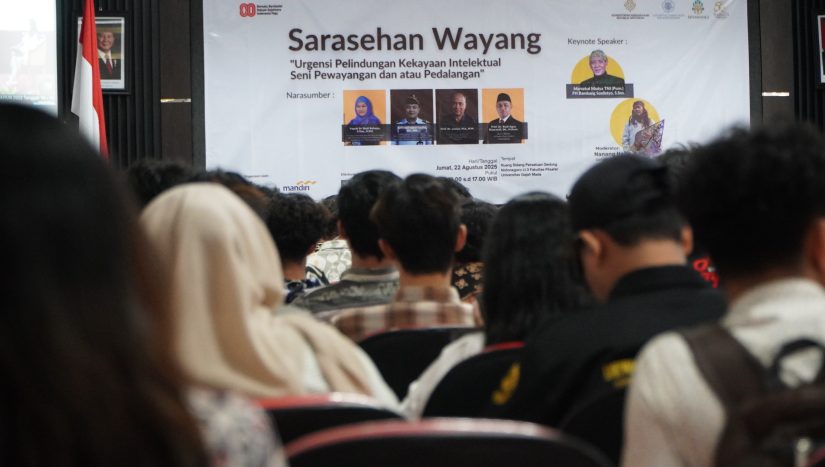
The Faculty of Philosophy, Universitas Gadjah Mada (UGM), in collaboration with the Indonesian National Wayang Secretariat (Senawangi) and the Ministry of Culture of the Republic of Indonesia, held a Sarasehan Wayang (Wayang Symposium) on August 22 under the theme “The Urgency of Intellectual Property Protection for Wayang Arts and/or Puppetry.” The event, attended by artists, academics, students, and the public, served as an important forum to discuss the protection of the nation’s esteemed cultural heritage in the face of modern challenges.
Dean of the Faculty of Philosophy, Prof. Dr. Rr. Siti Murtiningsih, S.S., M.Hum., emphasized that intellectual property protection has become increasingly critical in the era of technological advancement, particularly with artificial intelligence (AI), which often blurs the boundaries between original and reproduced works.
“It is an honor for the Faculty of Philosophy to be among wayang practitioners. This is the right moment for us to discuss the urgency of protecting the intellectual property of wayang arts and puppetry in an era when the world is encircled by AI,” she remarked.
The symposium focused on formulating strategies to address major challenges in protecting wayang arts. Director of Cultural Value Empowerment and Intellectual Property Facilitation at the Ministry of Culture, Yayuk Sri Budi Rahayu, S.Sos., M.Pd., highlighted the growing urgency of copyright protection for puppeteers and wayang artists.
“Wayang has already been recognized as a world heritage by UNESCO, but what matters is not the recognition itself—what is important is what we do after the recognition. Wayang is not merely a form of performing art, but a reflection of noble values, a philosophy of life, and a treasured cultural heritage of the Indonesian nation,” she explained.
She added that while technology opens great opportunities for wayang to reach wider audiences both nationally and internationally, the ease of replication and distribution in the digital era also increases the risk of exploitation.
“The works or creations of puppeteers and wayang artists can be so easily adapted, reproduced without consent, or even claimed unilaterally. The current flow of information is unstoppable, but how we safeguard this vulnerable cultural heritage is something we must carefully address. The future of traditional cultural expressions must be our concern,” she stressed.
The event was also part of the 50th anniversary celebration of Senawangi. In his address, Senawangi’s Chairman, Air Marshal (Ret.) FH Bambang Soelistyo, S.Sos., affirmed that the organization’s five decades mark a milestone of maturity.
“It is hoped that Senawangi will continue to work tirelessly, hand in hand with elders and the younger generation, to preserve and strengthen the existence of wayang and puppetry across the archipelago,” he said. He further expressed his hope that the symposium would generate new ideas for young generations in engaging with the world of wayang, particularly in addressing the issue of intellectual property protection.
